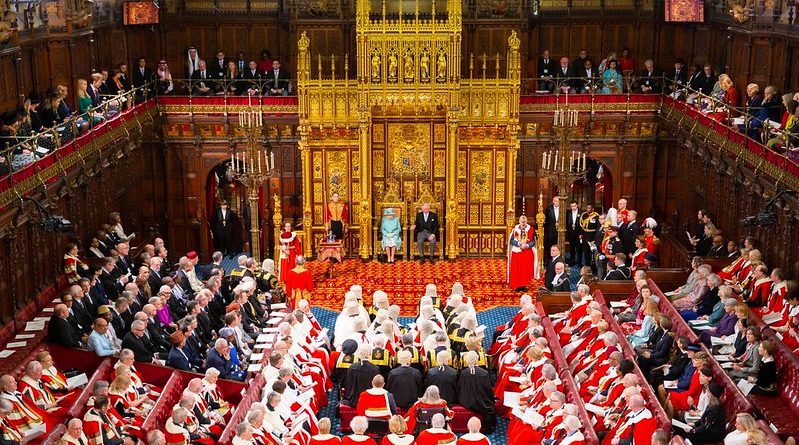Withdrawal agreement bill: Lords defeat government over EU citizens’ rights
The House of Lords has passed with 270 votes to 229 an amendment to the withdrawal agreement bill requiring the government to put in place a system that gives EU nationals in the UK the automatic right to stay after Brexit.
The amendment also calls on the government to issue a physical document so that EU citizens can prove their residence rights.
The withdrawal agreement bill, which turns the deal on the exit from the European Union into national law, already passed in the House of Commons. Ten amendments, including one on citizens’ rights, were proposed when the bill was debated on 7 and 8 January 2020. All of them were rejected.
Some, however, have been brought back as the text is discussed in the House of Lords. The cross-party amendment introduced by Lord Oates aims at removing the bill’s references to a constitutive system, under which EU nationals are requested to apply for ‘settled status’ by 30 June 2021 to be able to stay.
The amendment requires the UK government to put in place a registration scheme instead, giving EU citizens the automatic right to stay and ensuring they receive a physical document to prove their status.
Lord Oates had already introduced a bill to establish a declaratory approach in the summer of 2019. “It is a simple matter of honouring a pledge made over three years ago to EU citizens resident in the United Kingdom,” he said at the time. The bill tried to “merely confirm the existing right” so that missing the application deadline “would render one undocumented but not unlawful.”
That bill failed to complete the parliamentary procedure before the general election. But the same principles were re-proposed with the amendment to the withdrawal agreement bill that passed on Monday.
The vote was a defeat for the government, which has designed the ‘settled status’ scheme to replace the EU’s ‘permanent residence’ system. EU nationals are required to apply for settled status by 30 June 2021 and receive a digital code when their status is confirmed.
Documenting residence status
The vote occurred on the day a survey showed that EU nationals are not happy with a digital status only.
Carried out among EU nationals by Professor Tanja Bueltmann of Northumbria University and citizens’ rights group the3million, the survey reveaels that 89% of respondents fear discriminations at work, at the border or trying to rent a property if left without a physical document proving their status. Some 10,9% said they were already being asked about settled status by landlords, banks, and councils, even though proof of the new legal position is not required before 2021.
A Europe Street News survey on EU mobile citizens last year also found that 63% of respondents felt they lack information about their post-Brexit rights and the vast majority (93%) reported feeling more anxious since the Brexit vote.
The Residential Landlords Association (RLA) and the Joint Council for the Welfare of Immigrants called on the government to issue physical cards to EU citizens.
On January 15 the European parliament overwhelmingly voted (610 in favour, 29 against and 68 abstentions) a resolution expressing concerns about the UK EU settlement scheme. MEPs argued that “greater certainty and a greater sense of security would be generated for EU-27 citizens in the UK if they were issued with a physical document as proof of their right to reside in the UK after the end of the transition period.”
A short-lived success
Luke Piper, a solicitor who advises the3million, said the Lords amendment was a “good result.”
The success, however, may not last long as the amendment is likely to be rejected by the House of Commons, where the government has a big majority.
Security Minister Brandon Lewis said the government does not intend to change policy: “I disagree with the results of today’s vote. The EU Settlement Scheme grants #EUcitizens with a secure, digital status which can’t be lost, stolen or tampered with. There will be no change to our digital approach,” he stated on Twitter.
Lord Oates later responded: “No one is suggesting dropping a digital system, we are proposing that EU citizens are given physical proof as well.”
And this was the reaction of Guy Verhofstadt, Brexit coordinator at the European parliament:
Update on January 22: the House of Commons rejected the amendment (338 votes to 252) and the withdrawal agreement bill will approved unchanged.
Claudia Delpero © all rights reserved.
Photo: the Lords chamber during the Queen’s speech. Copyright House of Lords 2019 / Photography by Roger Harris.
Europe Street News is an online magazine covering citizens’ rights in Europe. We are fully independent and we are committed to providing factual, accurate and reliable information. We believe citizens’ rights are at the core of democracy and information about these topics should be accessible to all. This is why our website and newsletter are available for free. Please consider making a contribution so we can continue and expand our coverage.




